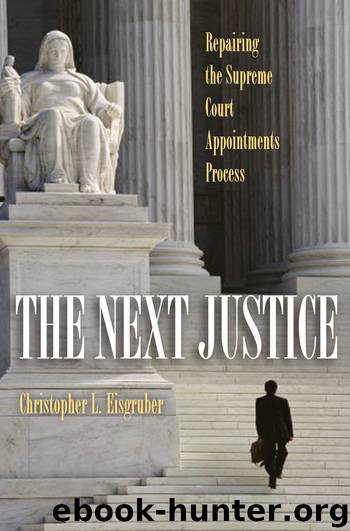The Next Justice by Eisgruber Christopher L

Author:Eisgruber, Christopher L.
Language: eng
Format: epub
ISBN: 9781400827824
Publisher: Princeton University Press
Moderate Judicial Philosophies
O’Connor’s solicitude for an integrated, inclusive society bears more than a passing resemblance to Breyer’s concern for active liberty and democracy. These commonalities should not be surprising: both Breyer and O’Connor are often described as moderate justices. Indeed, our examination of their judicial philosophies enables us to develop a more precise account of what it means for a justice to be a judicial moderate. That opportunity is worth pursuing. The concept of a “judicial moderate” figures prominently in public debates about Supreme Court appointments, and it will receive substantial attention in the chapters ahead. Yet many different justices have been labeled moderates: John Marshall Harlan III, Lewis Powell, John Paul Stevens, Sandra Day O’Connor, Anthony Kennedy, David Souter, Ruth Bader Ginsburg, and Stephen Breyer, for example. These justices have sometimes disagreed sharply about the Court’s most controversial cases. What common threads unite them?
One might suppose that a judicial moderate is any judge who occupies the ideological middle ground on controversial constitutional questions. There is a lot of truth to that simple definition. Ideological values are critical ingredients of judicial philosophies, and one of the things that distinguishes judicial moderates is that their overall pattern of decision making tends to be ideologically moderate. Sandra Day O’Connor satisfied this criterion with respect to virtually every constitutional topic; indeed, it is hard to think of an issue on which O’Connor was not in the Court’s ideological middle. Most moderate justices, though, will exhibit ideological moderation on many, but not all, issues. For example, John Paul Stevens’s establishment clause jurisprudence has been among the Court’s most steadfastly liberal, but he has sometimes voted with conservatives on issues such as affirmative action, criminal procedure, and the authority of states to regulate the abortion rights of minors.72 Anthony Kennedy has been one of the Court’s most reliably libertarian justices on free speech issues, which is not a “middle ground” position—but, since free speech rights do not correlate neatly with liberal or conservative ideologies, Kennedy’s votes in free speech cases have sometimes pleased liberals (such as when he joined the Court’s opinions striking down prohibitions on flag burning) and at other times pleased conservatives (such as when he helped to strike down prohibitions on hate speech).73
Yet while our examination of Supreme Court decision making showed that ideological values are crucial ingredients of judicial philosophies, it also showed that ideology is not the whole story. And ideology is not the whole story with regard to judicial moderation either. Justices who are commonly regarded as moderates share a procedural perspective as well as an ideological one; indeed, the procedural commonalities are as important as the ideological ones.
The procedural similarities are manifest in the judicial philosophies of Breyer and O’Connor, which share two significant features: an open-mindedness toward novel claims of constitutional justice brought by disadvantaged groups or persons, and a lively and thoughtful understanding of the limits of the judicial role. Both Breyer and O’Connor have recognized that the Court has a special role to play in protecting disadvantaged groups within American society.
Download
This site does not store any files on its server. We only index and link to content provided by other sites. Please contact the content providers to delete copyright contents if any and email us, we'll remove relevant links or contents immediately.
Objection! by Nancy Grace(1333)
Anatomy of Injustice by Raymond Bonner(1269)
Apeirogon by Colum McCann(1247)
That Every Man Be Armed by Stephen P. Halbrook(1240)
Injustices by Ian Millhiser(1201)
The Vaccine Court by Rohde Wayne(1192)
Civil Procedure (Aspen Casebooks) by Stephen C. Yeazell(1180)
Storytelling for Lawyers by Meyer Philip(1140)
Restitution by Restitution(1116)
A Practical Guide to International Arbitration in London by Hilary Heilbron(1085)
Coercing Virtue by Robert H. Bork(1027)
Tangled Webs: How False Statements Are Undermining America: From Martha Stewart to Bernie Madoff by James B. Stewart(1027)
The Tools of Argument: How the Best Lawyers Think, Argue, and Win by Joel Trachtman(1027)
Broken Scales by Joel Cohen(1020)
INDEFENSIBLE: One Lawyer's Journey Into the Inferno of American Justice by Feige David(1011)
American Tragedy by Lawrence Schiller & James Willwerth(960)
A Religious Orgy in Tennessee by H.L. Mencken(951)
A Matter of Interpretation by Antonin Scalia(943)
Tangled Webs by James B. Stewart(926)
